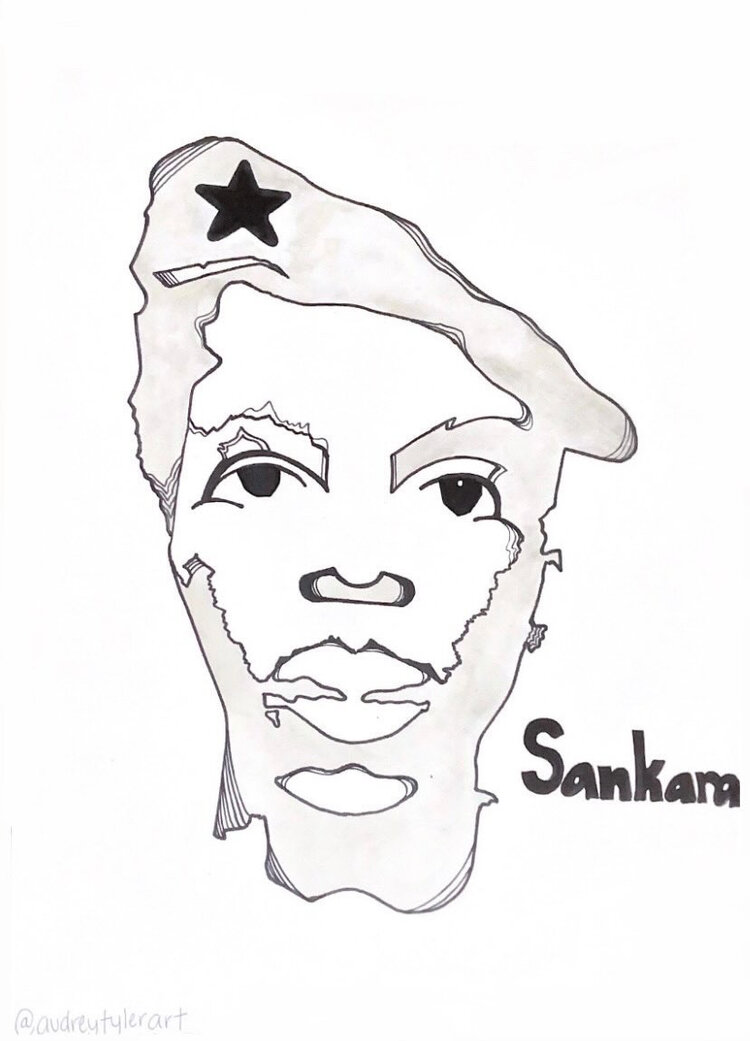Thomas Sankara: The Land of the Upright People
banzai #history

Art by @audreytyleart
Thomas Sankara was a Pan-Africanist Marxist-Leninist and former president of Burkina Faso, formerly known as Upper Volta. Sankara is oftentimes compared to the Argentine born revolutionary, Che Guevara. Many of his radical actions, ideas, and planning were inspired by Che Guevara. Born in 1949, Thomas Sankara was one of ten children to two Roman Catholic parents. Although his parents wanted him to go down a religious career path, he instead chose to join the military in his late teens. Shortly after he enlisted, he was sent to Madagascar for military-related officer training. During his time in Madagascar, he had witnessed student and farmer uprisings in 1971 and 1972 against the corrupt regime. These uprisings lead to a more radical government in Madagascar, setting the tone for the rest of the continent to also participate in radical politics. In Madagascar, he was introduced to the writings of Karl Marx and Vladimir Lenin, significantly changing the course of his life. In 1976, a group of young officers and Sankara had set up a secret organization within the military; The “Communist Officers’ Group.”
Eventually in 1981, he was given a position of power under the current government, which had just been seized by a group of military officers. The administration in place was considerably disliked, and was followed by yet another coup in 1982. By overthrowing the president, Jean-Baptise Ouedraogo; Sankara became Prime Minister. Sankara advocated for a more progressive push for reform on topics such as education and healthcare. After a short four months as prime minister, Sankara was relieved of his position after he was arrested alongside several Communist Officers’ Group members. A good friend of his, Blaise Compaore, led a coup in retaliation to Sankara and the other men’s arrest. The coup was successful and Thomas Sankara was promptly made President in the summer of 1983, with the support of Libya (who at the time was edging a war with the French) and several other surrounding African countries.
A year into his presidency, Sankara renamed the country Burkina Faso, which holds the powerful meaning of “the land of the upright people.”
As soon as he got into office, Sankara’s focus was to address the problems of homelessness, healthcare, and food. However, one of the biggest issues he faced was vaccinations and immunization. Within the first two years of his presidency, he created programs that allowed over 2 million Burkinabe people to get vaccinated for diseases like polio and measles. Sankara increased infrastructure and housing projects as well, mostly by boosting the productive output of brick factories, enabling thousands of stable houses to be built. Deforestation was also an increasing issue in the region, so Sankara initiated programs that pushed for heavily government supported plant nurseries and mass tree planting programs.
With women’s issues, he aimed for the reconstruction of social interaction; men were encouraged to take on the traditional roles of women, whereas women were encouraged to receive an education and received rights such as the ability to initiate divorce. Thomas Sankara was the first African leader to appoint women into major governmental positions, and active military positions.
A big thing Sankara was trying to prove to the world was that African countries didn’t need the support of western countries through foreign aid, and instead African nations are capable of doing well on their own. His thoughts on foreign aid were very strong; “he who feeds you, controls you.” He was adamantly against receiving any sort of foreign aid. In contrast, Cuba had heavily relied on the USSR for military equipment, food and other materials. Eventually, when the USSR was dismantled, Cuba was ultimately destabilized and lost many of their achievements.
October 15th of 1987, Thomas Sankara was assassinated by an armed group during a coup led by none other than his close friend, Blaise Compaore. Compaore became president (arguably a dictator) following the assassination, and remained the country’s leader until 2014. Immediately after Sankara’s death, Compaore overturned a majority of his policies, and re-joined several organizations such as the World Bank, which Sankara had purposely retracted from.
Just recently in 2016, Mariam Sankara, Thomas Sankara’s widow, called out the French government for his assassination and demanded an investigation. In October of this past year, Burkina Faso opened an investigation to find out who exactly killed him and what their intentions were. Although it’s still unclear as to who was the killer, many believe that western nations (specifically the United States and France) had major influence in the assassination of the Marxist-Leninist pan-Africanist leader.
This past January, there was another military coup, expelling the democratically elected president. On February 16th, American-trained soldier, Lt. Col. Paul-Henri Sandaoga Damiba was sworn in as the nation’s new president. The United States has a long history of training African soldiers who go on to lead military backed coups, and Damiba is a perfect example of just that. The intentional destabilization of socialist countries, or countries with a socialist past, is incredibly obvious. This isn’t an occurrence specific to Africa, as western capitalist nations have encouraged this across the globe, with prime examples also occurring in Latin America.
Although he had a tragic ending, Thomas Sankara led a triumphant government; increasing vaccination rates, improving overall healthcare, bettering conditions for women, increased education rates, and so much more were achieved in a short four years. I think that it’s important to understand and remember that Sankara was a major figure in the advocacy of environmental protection and policy, and in securing basic human rights for the people of Burkina Faso.